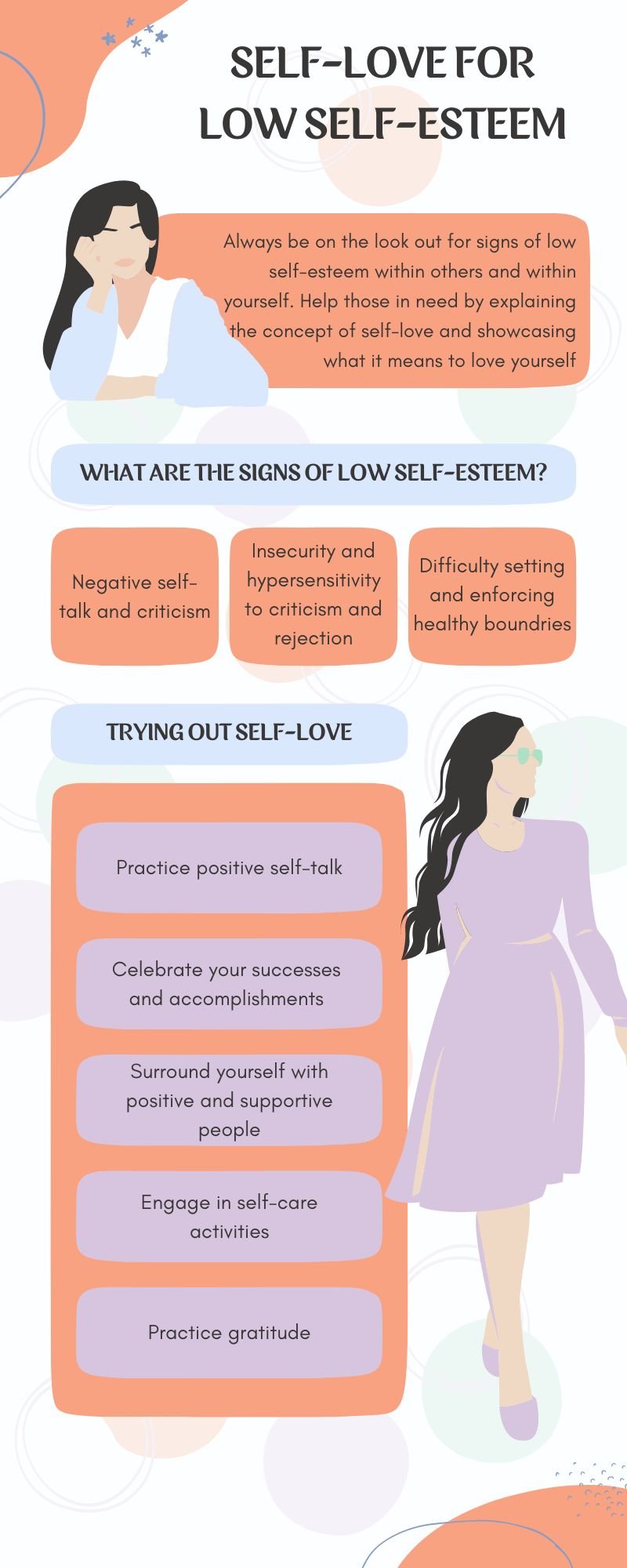Signs of low self-esteem (and how to overcome them with self-love)
Low self-esteem is a common yet complex issue that can profoundly impact our mental health and overall well-being. Low self-esteem is typically displayed as a persistent negative self-image, feelings of inadequacy, and an inability to believe in our abilities and worth. If left unaddressed, it can lead to various mental health problems, including depression, anxiety, and relationship difficulties.
Signs of low self-esteem
While everyone seems to develop a unique set of behaviors regarding their self-esteem, general trends emerge that can allow others to see the signs of low self-esteem. A few signs of such perception include:
Negative self-talk and self-criticism: Individuals tend to focus on their perceived shortcomings and flaws, rather than their strengths and positive qualities. They may engage in harsh self-criticism and engage in a cycle of negative self-talk.
Difficulty accepting compliments or recognizing their strengths: People with low self-esteem often struggle to accept compliments or recognize their accomplishments, viewing them as flukes or exceptions rather than evidence of their worth.
Insecurity and hypersensitivity to criticism or rejection: Low self-esteem can cause individuals to be overly sensitive to criticism or rejection, leading to feelings of insecurity and a constant need for approval from others.
Avoidance of new challenges or experiences: Fear of failure or negative judgment can cause individuals with low self-esteem to avoid taking on new challenges or experiences, limiting their growth and potential.
Dependence on external validation: People like this may have a strong desire for the approval of others, and may rely on persistent external validation to feel good about themselves.
Difficulty setting and enforcing healthy boundaries: Low self-esteem can make it challenging for individuals to set and enforce healthy boundaries, leading them to put others' needs before their own.
Perfectionism and excessive self-doubt: Struggles with perfectionism can be quite common in these individuals, which can cause them to become overly critical of themselves and their abilities.
Chronic feelings of shame, guilt, or worthlessness: Low self-esteem can result in chronic feelings of shame, guilt, and worthlessness, which can have a profound impact on one's mental and emotional well-being.
Healing with self-love
Fortunately, low self-esteem can be addressed and overcome through self-love and self-compassion. Self-love involves accepting and valuing yourself, even with all your flaws and imperfections. It consists in developing a positive and supportive inner dialogue while recognizing your strengths and accomplishments. Self-compassion involves treating yourself with the same kindness, understanding, and support that you would offer to a close friend.
Here are some strategies to help you develop self-love and self-compassion:
Practice positive self-talk: Reframe negative self-talk into positive affirmations, focusing on your strengths and positive qualities.
Celebrate your successes and accomplishments: Make a habit of acknowledging and celebrating your achievements and accomplishments, no matter how small they may seem.
Surround yourself with positive and supportive people: Seek relationships with people who believe in you and support your growth and development.
Engage in self-care activities: Take care of your physical, emotional, and mental well-being by engaging in activities that bring you joy and relaxation, such as exercise, meditation, and hobbies.
Practice gratitude: Take time each day to reflect on the things in your life that you are grateful for, like your strengths and qualities.
Low self-esteem can be a challenging and ongoing struggle, but it is possible to overcome by focusing on your strengths, treating yourself with kindness, and engaging in your self-care.
Types of self-care for developing self-love
Self-care is a critical component of developing self-love, as it allows individuals to prioritize their needs and well-being. Self-care activities help people create positive and supportive relationships with themselves, build resilience, and improve their mental and emotional health. Here are several self-care activities that can help individuals cultivate self-love:
Exercise: Regular physical activity can improve mood, increase energy levels, and boost self-esteem. Choose an activity that you enjoy, such as walking, running, cycling, or swimming, and make time for it in your schedule each week.
Meditation and mindfulness: Practicing mindfulness and meditation can help individuals develop self-awareness, reduce stress, and improve their overall sense of well-being. There are many apps and resources available to help you get started with mindfulness and meditation practices.
Journaling: Writing down your thoughts and feelings can help you process and make sense of your experiences. Regular journaling can also improve self-reflection and self-awareness.
Creative pursuits: Engaging in creative activities, such as painting, drawing, photography, or music, can be a wonderful way to express yourself, reduce stress, and improve your mood.
Spending time in nature: Spending time in nature has been shown to reduce stress and improve mood. Take a walk in the park, go for a hike, or simply sit outside and soak up the sun.
Getting enough sleep: Sleep is essential for good mental and physical health. Make sure you are getting enough sleep each night and create a bedtime routine that helps you wind down and relax before bed.
Connecting with others: Strong social connections are critical to our mental and emotional well-being. Spend time with friends and family, reach out to people you trust for support, and join a group or club that aligns with your interests.
No matter the plan, developing self-love requires a commitment to self-care. By incorporating self-care into your daily routine, you can improve your mood, reduce stress, and develop a more positive and supportive relationship with yourself. There are many ways to prioritize your well-being and cultivate self-love, so you can personalize your routine in the way that matters to you.
“Love yourself first, and everything else falls in line” - Lucille Ball

